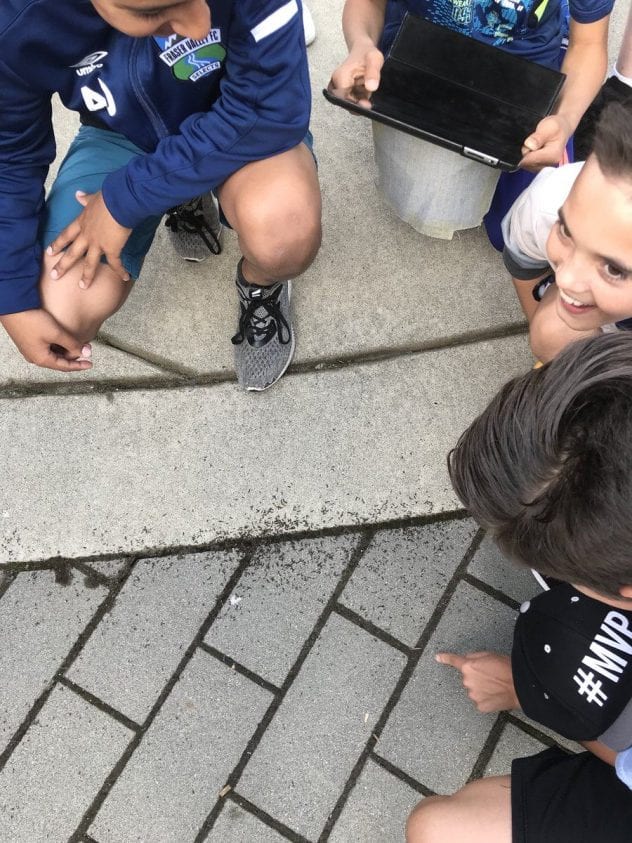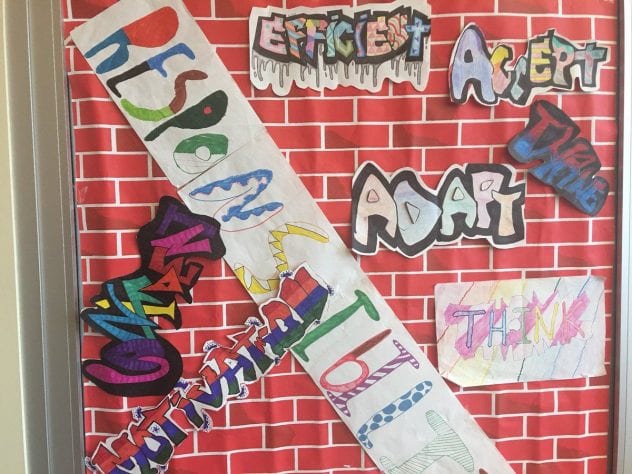By Nimi Sidhu (Middle School teacher; MEd student in Imaginative Education)
If I asked you today to trade in your name for one word that represents all you want to be, what word would you choose and why?
This was the question that I asked my sixth graders in January of this year to set them up for the One Word challenge. The One Word challenge is something that I had started in my own life in 2006 at the start of the new year and have been doing so every year since then. The idea behind the challenge, is to ditch New Year’s resolutions, which don’t particularly work for the vast majority of people, and to choose one word instead to be a guide towards self improvement and awareness. The One Word is meant to be a guide to help one go from their real self to their ideal self with a sense of awareness and understanding of one’s journey. Each word that I have chosen since that first time in 2006, has become the title of a chapter in my life story and has helped make me a much more self aware person. With my ‘teacher lense’ always focusing on novel ideas to bring into the classroom, I couldn’t help but think of the potential that a one word challenge could have with students.
Convinced that it was something that could work in a classroom to enhance personal awareness, I tried it with a group of students for the first time a few years ago. The idea was met with enthusiasm but quickly fizzled. At the time, having students record their experience with One Word in the form of monthly journal prompts seemed like the best thing to do. My students began to groan by March. We never talked about it again.
Fast forward to this 2018, armed with a newfound knowledge of cognitive tools I decided to give it another go. Seeing first hand, how cognitive tools allow for the curriculum content to be truly understood and retained, I began wonder if cognitive tools could also be used as a means for better understanding of the self. We began the conversation of choosing our one word in December of 2017. Because choosing your One Word has the potential to be a transformative experience, i wanted to start the process in a way that was intimate and significant and build a sort of ceremony around it. Changing the context, a cognitive tool which Imaginative Education founder Kieran Egan highlights as an important one to combat the ‘taken for grantedness’ that comes from learning in the same environment continuously. In this instance, we changed the context by moving all of the desks aside, and creating a circle in the middle of our room. We turned the bright classroom lights off and enjoyed the ambience created by the Christmas lighting that was up around the room. Our ceremony really just consisted of a conversation about the One Word Challenge but it was clear that there was enthusiasm for the challenge.
In January, when my students came back, they were eager to share the one word they had chosen. Knowing that i had ‘failed’ at having students do journal entries around the One Word in the past, I decided this time, to capitalize on a graffiti doodling trend that was a part of our classroom. Afterall, the idea behind one word was to invest yourself in the word to the extent that it could potentially replace your name. I asked students to reveal their one word through a graffiti art representation. As we worked on our art used the tool of revolt and idealism by having students explore the question, “Is graffiti art or is it vandalism?”, This sparked some fun debate. A great little Ted Ed lesson lead us into a mini inquiry of how graffiti as well as how it is used today. The final graffiti art was displayed as a collection and it was a joy to witness some of the spontaneous conversations that took place between students. When students were finished, they were asked to right an artist statement about their graffiti and explain why they chose their one word. The accompanying writing was much more powerful than a journal entry. In the remaining months of the school year, I intentionally wove the one word into one-on-one conversations with students, as well as with report card comments. In class, we created metaphors of our one word, made connections between our one word and characters in novels and we even did a nature walk, were we looked for things which represented our one word. To watch students gathered around an ant colony and see how the heroic qualities of their one words demonstrated in the hustle and bustle of their insect lives.

I am happy that I gave the One Word Challenge a go this year. Through the metaphors students created, the pictures they took and the art work they proudly displayed, they were able to share their aspirations and fears in a way that was freeing and safe. I was able to help them better understand how perceived ‘failures’ are a part of the journey to their ideal selves. Most of all, students had fun, and they were having constructive and encouraging conversations with each other. Going forward, I see the one word challenge as something that is better suited for the beginning of the school year as opposed to January. It has been such a rewarding experience and to have more time with students to document their journey would be Onederful.



Great post Nimi, I love this invite into language study.
Can I use this idea in my workshop on metaphor?
Hi David,
Thank you very much. Yes, please feel free to share!
Warmly, Nimi Sidhu